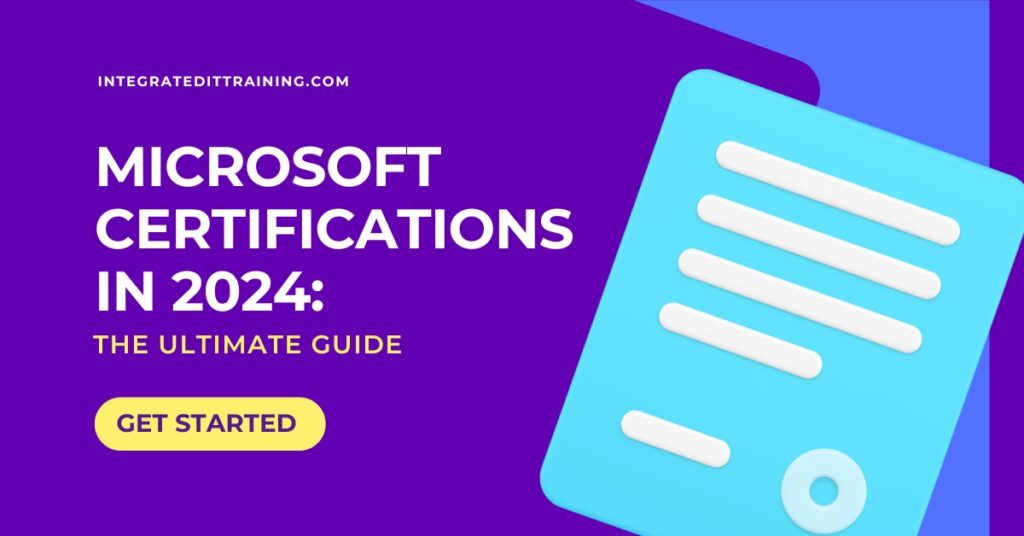
A successful professional must keep up-to-date with the modern world’s constantly changing technologies to remain relevant. The importance of Microsoft certifications has increased as we move into 2024, as such certifications have been recognized as indicators of competence in many fields. In this post, you’ll find an all-encompassing Guide to Microsoft certifications training programs, the advantages of becoming Microsoft certified, and the training tools you’ll need to succeed.
What is Microsoft Certification?
The Microsoft certification system has evolved significantly in recent years, transitioning from being closely tied to specific products to integrating them into general job roles. These certifications comprehensively assess IT professionals’ proficiency and knowledge across a spectrum of skills. They can be obtained through diverse avenues, including the self-study approach, vendor training, and online classes.
“Enroll in Integrated IT Training today and elevate your skills with Best Microsoft certifications 2024 for a brighter professional future”
Pathways to Career Development that Relate to Microsoft Certifications
Microsoft has intentionally structured its certifications with a role-based design, focusing on the competencies essential for success in typical IT positions. The company is keen on aligning its certifications with the latest industry trends and endeavors to ensure its industry specificity. The Certifications from Microsoft are customized to cater to the ten most crucial roles in the cloud field.
- AI Engineer
- Cloud Administrator
- Cloud Developer
- Cloud Solutions Architect
- Data Engineer
- Data Scientist
- DevOps Engineer
- Functional Consultant
- Security Engineer
- Solutions Architect
What Kinds of Microsoft Certificates Integrated IT Training Provider?
Seven technologies are the basis for Microsoft certifications. They are:
- Microsoft SQL Server 2019 – Big Data
- Microsoft AZ-900 Microsoft Azure Fundamentals
- Microsoft AZ-203 Building Solutions that work with Microsoft Azure
- An Introduction Microsoft Power BI
- Microsoft 98-366 MTA Networking Fundamentals
- Microsoft 98-365 MTA Windows Server 2016 Administration
- Microsoft 70-765 SQL Server 2016 Provisioning SQL Databases
There are three types of certificates you can pursue for these techniques:
- Essential Certifications This is the ideal course for those just beginning to get Microsoft certificates.
- Role-Based Certificates – The main course focuses on developing the abilities required to fulfil a specific role in the job. Role-based associate and expert certifications fall into distinct classes. The roles that Microsoft defines for Microsoft include:
- Administrator
- AI Engineer
- Data Engineer
- Data Scientist
- Developer
- DevOps Engineer
- Functional Consultant
- Security Engineer
- Solution Architect
- Specialty Certifications: It is possible to develop your technical knowledge and use it to implement solutions for the industry.
Fundamental Certifications
No matter how you think about it, regardless of the way you look at it, whatever way you look at it, the Fundamentals certificate can assist you in getting a job that you love. The basic skills are crucial if you want to work in computer technology. There are nine basic certifications:
- Security, Compliance, and Identity Fundamentals
- Dynamics 365 Fundamentals
- Dynamics 365 Fundamentals (ERP)
- Power Platform Fundamentals
- Azure AI Fundamentals
- Dynamics 365 Fundamentals (CRM)
- Azure Fundamentals
- Microsoft 365 Certified: Fundamentals
- Azure Data Fundamentals
With Microsoft being among the top technology companies in various industries, it’s no wonder that you should look at the technologies that Microsoft offers and the ways they can assist companies in maximizing the benefits of these technology solutions.
For a boost in your profession and to distinguish yourself from your peers, You can think about getting Microsoft Certifications that will give you credibility and authority in the world of IT.
Basic Microsoft Certifications Courses
Five technologies are the primary ones that are the basis for Microsoft certifications courses. They are categorized. This includes:
- Microsoft Azure Certifications
- Microsoft 365 Certifications
- Dynamics 365 Certifications
- Power Platform Certifications
- Safety, Compliant and Certificate Certifications
There are three types of certificates you can pursue for these techniques:
- Essential Certifications This program is ideal for individuals just beginning to get Microsoft certificates.
- Role-Based Certifications: The primary program focuses on acquiring the capabilities required for the specific role in your job. Role-based associate and expert certificates are separated into different groups. The roles that Microsoft defines for Microsoft include:
- Administrator
- AI Engineer
- Data Engineer
- Data Scientist
- Developer
- DevOps Engineer
- Functional Consultant
- Security Engineer
- Solution Architect
- Specialty Certifications: It is possible to develop your technical knowledge and implement industry-specific solutions.
Fundamental Certifications
Whichever way you view it regardless of the way you view it, Fundamentals certification will help you start a successful career. The basic capabilities are vital if you want to work in computing. There are nine basic certifications:
- Security, Compliance, and Identity Fundamentals
- Dynamics 365 Fundamentals
- Dynamics 365 Fundamentals (ERP)
- Power Platform Fundamentals
- Azure AI Fundamentals
- Dynamics 365 Fundamentals (CRM)
- Azure Fundamentals
- Microsoft 365 Certified: Fundamentals
- Azure Data Fundamentals
Certifications based on role
Administrators install and manage Microsoft Solutions. The certification process has three levels: Basic, associate, and expert. The types of certificates that are sought-after are:
- Azure Administrator Associate
- Azure for SAP Workloads Specialty
- Windows Virtual Desktop Specialty
- Azure Stack Hub Operator Associate
- Messaging Administrator Associate
- Modern Desktop Administrator Associate
- Security Administrator Associate
- Enterprise Administrator Expert
- Teams Administrator Associate
- Access and Identity Administrator Associate
Specialty Certificates
Before you attempt the specialty certification, be able to obtain the Associate or Expert certification. There are three different specialization certifications:
- Azure for SAP Workloads Specialty
- Azure Virtual Desktop Specialty
- Azure IoT Developer Specialty
What are the Advantages of Microsoft Certification?
Based on the research conducted in conjunctioN, earning certifications increases the credibility of one’s credentials and being highly sought-after as a potential candidate. The increased skills acquired through obtaining Microsoft Certification can put you at the top of the list for companies that rely heavily on Microsoft technology. Simply put, you’ll have a better chance of landing that dream job!
How to prepare for Microsoft Certification
Obtaining a Microsoft certification demands careful preparation and a well-planned strategy. This guide will walk you through the essential actions to ensure you succeed in your preparation procedure. In addition, you will learn how Integrated IT Training, your reliable IT training service, can assist you in your Microsoft certification training efforts.
1- Define Your Certification Goals
Before you begin the training process, identify your objectives for certification. Determine the Microsoft certification you’d like to earn per your professional goals and interests. An objective will help you plan your learning plan, whether you’re studying Microsoft Azure, Microsoft 365, or Dynamics 365.
2- Check your knowledge and skills.
Do a self-assessment of the knowledge and abilities you have that are related to the certification you have chosen. This will allow you to pinpoint areas that you require to pay more attention to in your study. Make sure you are open about your strengths and areas of weakness to help you create a specific study plan.
3- Select the Correct Material for the Study
Deciding on the appropriate study material is vital to ensure a smooth preparation. Use the official Microsoft training paths, documents and books recommended by Microsoft. Platforms online, like Integrated IT Training, offer courses specifically designed for Microsoft certifications courses.
4- Leverage Integrated IT Training Resources
Integrated IT Training, a top company that offers IT classes, has a range of customized tools to help you with the Microsoft certification. Our trainers are experts in the field who have years of experience. They will ensure you receive the highest quality education. Look at our various classes designed to be aligned with Microsoft certification training.
5- Be part of the Integrated IT Training Community.
Be part of The Integrated IT Training community, engaging with other learners and industry experts. Join discussions with other members, share your insights, and keep up-to-date with the most recent IT and Microsoft training developments.
What is the reason Microsoft Certifications Are Important?
Industry Recognition as well as Credibility
Microsoft certifications courses are widely recognized as proof of competence and proficiency. Employers typically look for candidates with Microsoft certifications as they view them as trustworthy evidence of competency in Microsoft technology.
Enhanced Career Opportunities
The status of being Microsoft certified provides many career possibilities. Whether you’re an IT professional as a researcher, data analyst or cloud specialist, there’s the Microsoft certification specifically tailored to the specifics of your field. The certifications can be necessary for many in-demand and lucrative jobs.
Staying Ahead of the latest technological advances
Microsoft constantly changes its certification tests to keep pace with current technologies. Experts ensure they remain abreast of market trends and methods by pursuing and keeping Microsoft certifications.
Conclusion
The process of preparing for the Microsoft certifications needs a carefully planned program, top-quality materials, and a welcoming learning setting. Integrated IT Training will provide the guidance and tools needed to complete your certification journey. Following these guidelines using the resources provided through Integrated IT Training, you’ll soon be on the road towards achieving Microsoft certifications successfully.
What are Microsoft certifications?
Microsoft certifications validate expertise in various technologies, demonstrating proficiency in Microsoft products and services.
Why pursue a Microsoft certification?
Pursuing a Microsoft certification enhances career prospects by validating skills, providing industry recognition, and opening doors to various job opportunities.
How can Integrated IT Training support my certification journey?
Integrated IT Training offers Microsoft certification roadmap 2024 preparation, ensuring you have the resources and guidance to succeed.







Leave a Reply